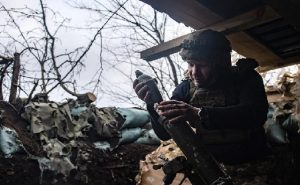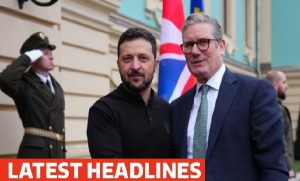19-02-2025
PARIS: Sir Keir Starmer has said any Ukraine peace deal would require a “US backstop” to deter Russia from attacking its neighbor again.
Speaking after a hastily convened meeting with European leaders in Paris, the prime minister repeated that he would consider deploying UK troops to Ukraine in the event of a lasting peace agreement but he said “a US security guarantee was the only way to effectively deter Russia”, and vowed to discuss the “key elements” of a peace deal with US President Donald Trump when the pair meet in Washington next week.
 Sir Keir said Europe would “have to do more” to defend the continent in the face of the “generational” security challenge Russia poses.
Sir Keir said Europe would “have to do more” to defend the continent in the face of the “generational” security challenge Russia poses.
He was keen to avoid explaining exactly what he meant by a “backstop” – but his allies suggest this could involve air support, logistics and intelligence capabilities.
European leaders convened at the Elysee Palace to discuss concerns over the Trump administration’s decision to initiate peace talks with Russia – due to start in Saudi Arabia on Tuesday alone.
Ukrainian President Volodymyr Zelensky has said Kyiv did not know about the talks and would not recognize any agreement made without its involvement.
US officials have suggested European nations would be consulted on peace talks with Russia, but not directly involved in them.
The Paris summit also took place days after US defence secretary, Pete Hegseth, said Europe would have to be primarily responsible for guaranteeing its own security going forward.
In his statement to reporters following the talks, Sir Keir said the US was “not going to leave NATO”, but that it was “time to take responsibility for our security, our continent”.
Polish Prime Minister Donald Tusk said transatlantic relations were in a “new stage”, and that the meeting had confirmed the time had come for “a much greater ability for Europe to defend itself”.
Sir Keir has indicated any troop contributions from the UK would be part of a multinational force to police the border between Ukrainian-held and Russian-held territory but experts say to do so effectively would be a massive undertaking that would require a large increase in defence spending.
 Malcolm Chalmers, deputy director of the Royal United Services Institute, said that, unlike UN peacekeeping forces there to observe, if the force being proposed is intended to deter Russian attacks, “it’s a whole different matter altogether”.
Malcolm Chalmers, deputy director of the Royal United Services Institute, said that, unlike UN peacekeeping forces there to observe, if the force being proposed is intended to deter Russian attacks, “it’s a whole different matter altogether”.
“You need credible, well-armed forces and you not only need frontline forces, you need back-up forces, and air forces, and so on,” he told media. “That’s a much bigger ask.”
General Sir Adrian Bradshaw, a former NATO commander, said: “This cannot be a token force, it cannot be something that observes bad behavior and stands on the sideline.” He told media that it would have to do “effectively what NATO does on its own turf really deter aggression”, and would need to be “underpinned by a grand strategy for containment of Russia” that would make clear any future conflict would not be contained to Ukraine.
“Essentially, the force needs to be large enough to defeat an incursion,” he added.
The former head of the British Army, Lord Dannatt, previously estimated such a force would need around 100,000 troops with the UK contributing about two-fifths.
“We just haven’t got that number available,” he said on Saturday, adding that getting the military into shape to perform this role would come at a considerable cost.
The UK currently spends around 2.3% of its total economic output on defence. The government has committed to increasing defence spending to 2.5%, but has not said when this will be achieved. (Int’l News Desk)
 Pressmediaofindia
Pressmediaofindia




